A couple years back, I began discussing coffee with a writer who was very particular about his beans. He said he couldn’t stomach any of the coffee in Los Angeles, opting to ship beans from Intelligentsia in Chicago. He fell in love with the Chicago coffee roastery while attending Northwestern. Ever since he alerted me to Intelligentsia, I soon began noticing it in the national press and began craving their coffee. It was fortuitous that Intelligentsia founder Doug Zell decided to open his first Los Angeles coffeehouse in my neighborhood. I was there on August 17 – opening day – to see if the product matched the legend. It did and does, and from what the baristas have been saying, the coffeehouse is just beginning to live up to its potential.
Intelligentsia owner Doug Zell chose to expand to Los Angeles because he thought the city would embrace his company’s seasonal, sustainable approach. For his West Coast flagship, he decided on Sunset Junction, a complex that already featured The Cheese Store of Silver Lake, Flea’s Conservatory of Music and Café Stella. Intelligentsia’s integration into the complex was seamless. You never would have known that the space had been derelict for years, or that it once housed a Latin grocery. Only a month old, Intelligentsia already feels like it’s been part of the community for years.
When asked to explain the origin of the name, Kyle Glanville, in charge of “Special Projects,” said, “The first coffeehouses are where the intelligentsia gathered. The first coffeehouses were outlawed because they were fomenting revolution.” Intelligentsia is a leading example of a “third wave” coffee bar. Second wave being the popularization by Peet’s and Starbucks. First wave being the commoditization of coffee.
Intelligentsia’s covered patio is painted an earthy red, framed by twin arches and handsome brick-work.
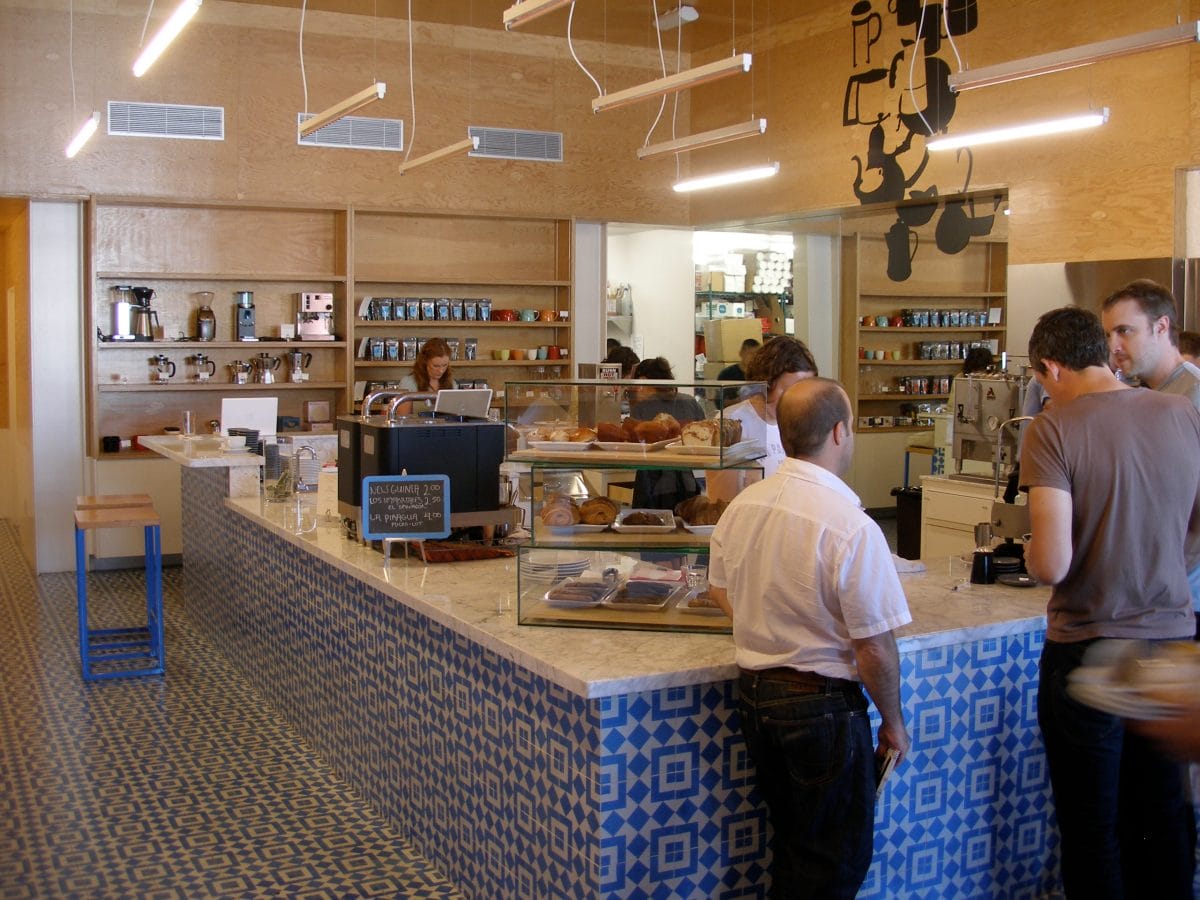
According to Kyle Glanville, “We wanted to do away with conventional trappings of coffeehouses…We got rid of overhead menus. We wanted to make it about contact with baristas. Keep it really open.”
The glass-fronted interior features plenty of natural light, which attracts a lot of customers who like to linger at the L-shaped coffee bar and write. The white marble bar holds nine stools, which offer great views of the action. The floor consists of blue and white Nicaraguan tile work. The walls are stenciled with black silhouettes of various coffee vessels, including French presses, pots and mugs.
Doug Zell hand-picked his baristas from some of the top coffeehouses in the nation, including several from Seattle, Mecca for coffee lovers. Kyle relocated from Victrola Coffee, on Capitol Hill. Deanna Mustard also comes from Capitol Hill, previously working at Espresso Vivace. To make it worth it for talented baristas to relocate, Doug paid higher salaries, provided full benefits and even paid for some people’s relocation fees. Nick Griffith didn’t relocate, but that doesn’t mean he isn’t committed to Intelligentsia. He commutes from Redlands, which requires an hour train ride and a half-hour bike ride, each way, each day!
Kyle’s been working to help open the location for a year, and several baristas have been training at an off-site roasting facility since May, even though they’ve “worked in coffee” for years.
Direct trade is a major focus at Intelligentsia, leading to a better product for customers and more profit for farmers, eliminating the middlemen. According to Kyle, “Farmers are starting to see real profit. In a tangible, economic way. We’re creating lasting business relationships.”
Intelligentsia could certainly earn more without direct trade, but Kyle made it clear that’s antithetical to their mission statement. According to Kyle, there are profit drains at every step. He used a micro-lot purchase as an example. “With a micro-lot, we might $3.65 a pound to the farmer, but our real costs are $6 a pound. There’s the price of the green (coffee), the price of transport, quality control with a couple preliminary roasts, and a 20 percent weight loss from roasting.” Then they only get 10 cups per pound.
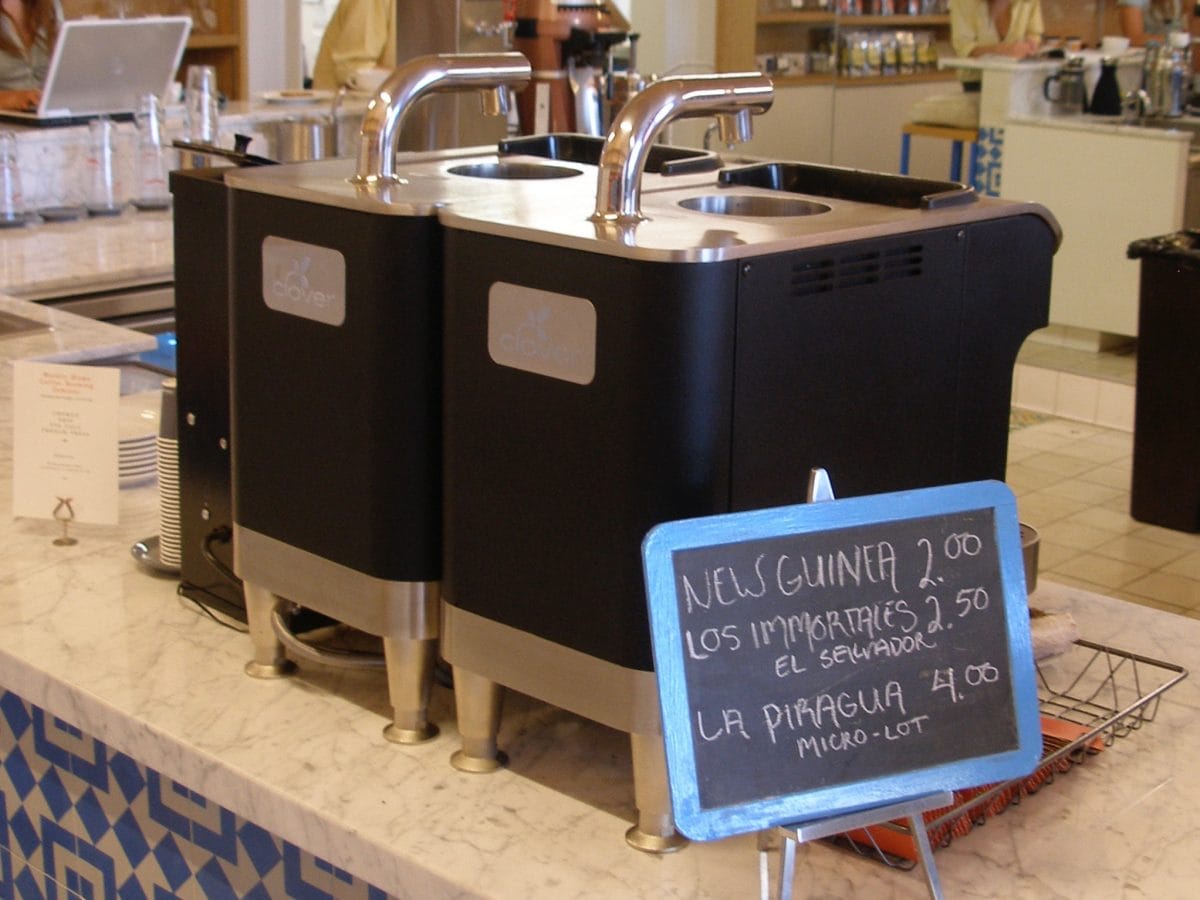
One of the Intelligentsia edicts is that the baristas make every drink to-order from deluxe Clover coffeemakers and custom-built Synesso espresso machines.
A blackboard next to the Clovers lists the day’s selection of 3-5 coffees. I’ve been an Intelligentsia regular since opening day. My first week, I made a point to try a different Clover-made coffee each day. Whether I drank a Yirgacheffe ($3.25) from Ethiopia, La Tortuga (The Tortoise, $2) from Honduras, Summer Solstice – primarily composed of Honduran beans, Papua New Guinea ($2), Los Immortales ($2.50) from El Salvador or Los Delirios ($2.50) from Nicaragua, I was uniformly impressed. The beans didn’t carry any of the bitterness I was used to at any of the coffee chains I drank at before I saw the light, where they dispensed hours-old coffee from big-batch tubs. No longer am I forced to drown my coffee in sugar to dull the intense “flavor.”
According to the Devin Pedde, a barista who often mans the Clovers, the weight of the beans (in grams) varies by day, to maintain “optimum performance.” He said that Intelligentsia doesn’t keep beans longer than eight days. “It’s not that it’s bad. It just loses what makes it unique.” Devin also said, “There’s old coffee, but there’s also coffee that’s too new.”
Geoff Watts is the company’s main coffee buyer, traveling 300 days a year to procure 2 million pounds of the world’s best coffee per year. In order to be able to purchase beans, Intelligentsia usually has to commit to buying a “container,” a shipping container that holds 320 bags, 60 pounds each. According to Kyle, Geoff is currently “going crazy in Africa, the new frontier.” With Geoff focusing on Africa, Kyle’s been able to assume some of Intelligentsia’s South American exploration. He recently retuned from Bolivia, his first time “going to origin.” Bolivia is the southernmost coffee producing country. Before Kyle’s arrival, a mill assembled the best beans in a two-hour radius, then selected the top beans for Kyle to cup. Kyle then selected fifty percent of the beans for Intelligentsia. He was also down there training local baristas. To end September, Kyle returns to South America, to explore the coffee farms surrounding Sao Paolo, Brazil.
Coffee is rated, or “cupped,” using a 100-point scale judging defects, cleanliness, flavor and other criteria. Intelligentsia buys three grades of coffee. AA cups out at 85-88. AAA cups out at 89-91 to 92. Micro-lots are 93-94. According to Kyle, “The price we pay to farmers is 25 percent above fair trade for AA. We pay an extra 15 cents a pound for organic. We try to reward quality.”
Geoff apparently just cupped a coffee in Rwanda that he marked at 100 points. The co-op micro-lot comes from Tuzamurekawa Cooperative in Gakenke, and should be appearing this fall at Intelligentsia. Geoff was only able to procure two bags at about $55 per pound. According to Kyle, “When we buy a coffee like this, it’s not something we’ll make money on.” It’s to generate buzz. Intelligentsia might charge $10 per cup, but to try the highest rated coffee on record, I’d probably be willing to pay that premium. Kyle said the Rwandan coffee is only a fraction of the cost of another recent haul. Intelligentsia just bought a 97-point Panamanian coffee called La Esmeralda for $130 a pound. The company considers the purchase so stellar, they plan to honor the beans with a release event, with dishes from local chefs and wine pairings.
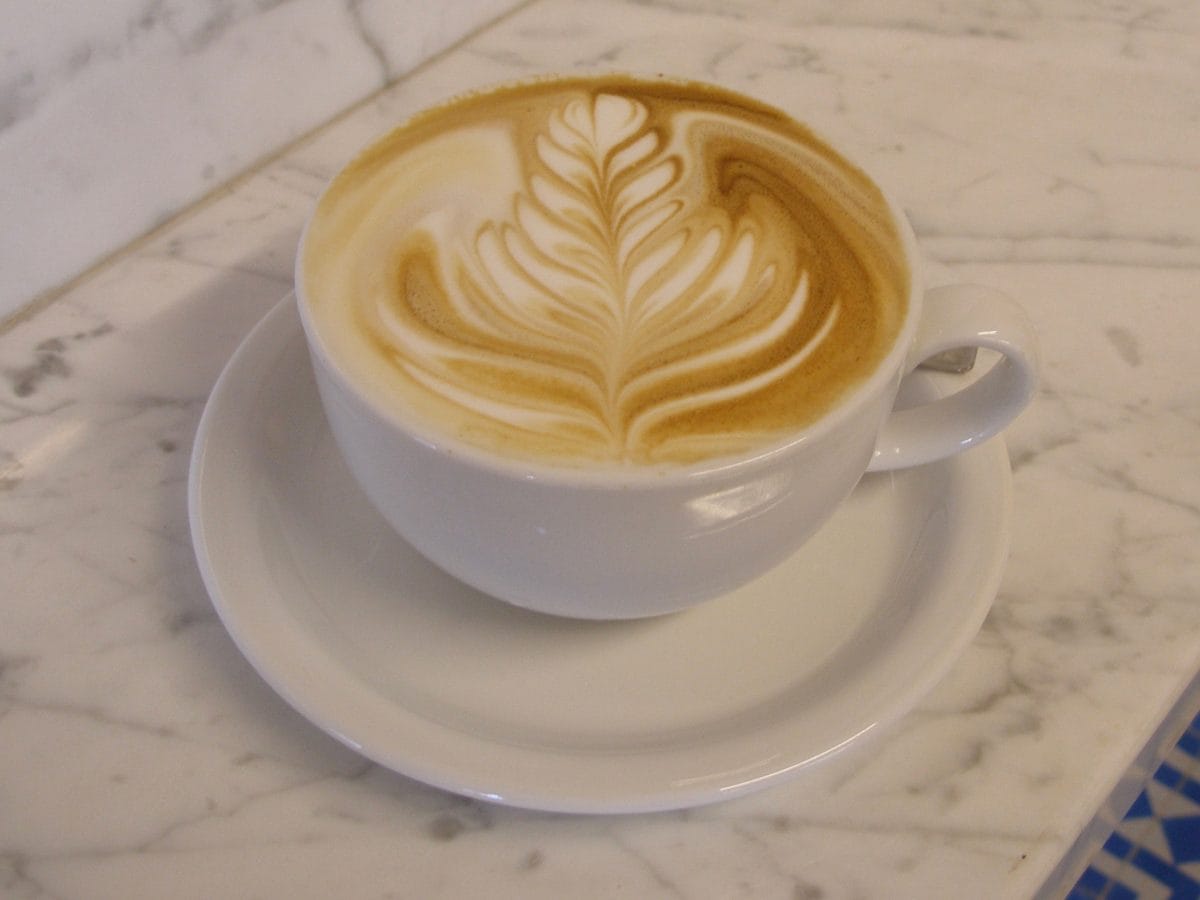
Kyle produced this latte with a whopping 18 fronds and was disappointed with his effort.
Intelligentsia also produces superior cappuccino, macchiato and house chai. If you’re looking for something sweet, mochas and hot chocolate made with ganache produced on a hot plate using melted bars of Scharffenberger 72% dark chocolate, heavy whipping cream and agave nectar as a sweetener. The primarily-organic loose leaf tea menu is highlighted by Melon White, Jasmine Silver Needles or the powerfully titled Iron Goddess of Mercy. There are four iced teas in the regular rotation: King Crimson, Moroccan Mint, The Classic and Ginger Plum Oolong.
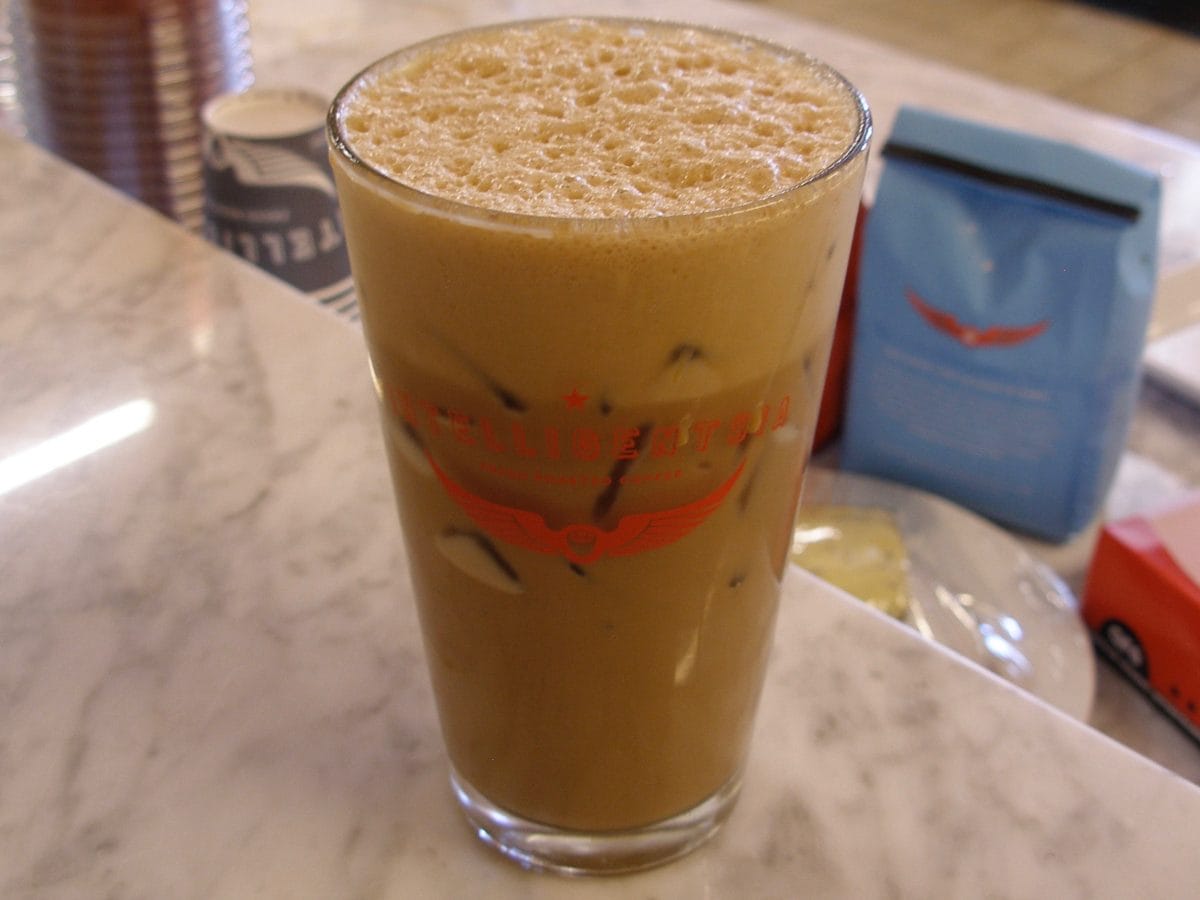
To honor its adopted city, Intelligentsia now offers the Iced Angeleno, four shots of espresso shaken with agave nectar, milk and ice until frothy.
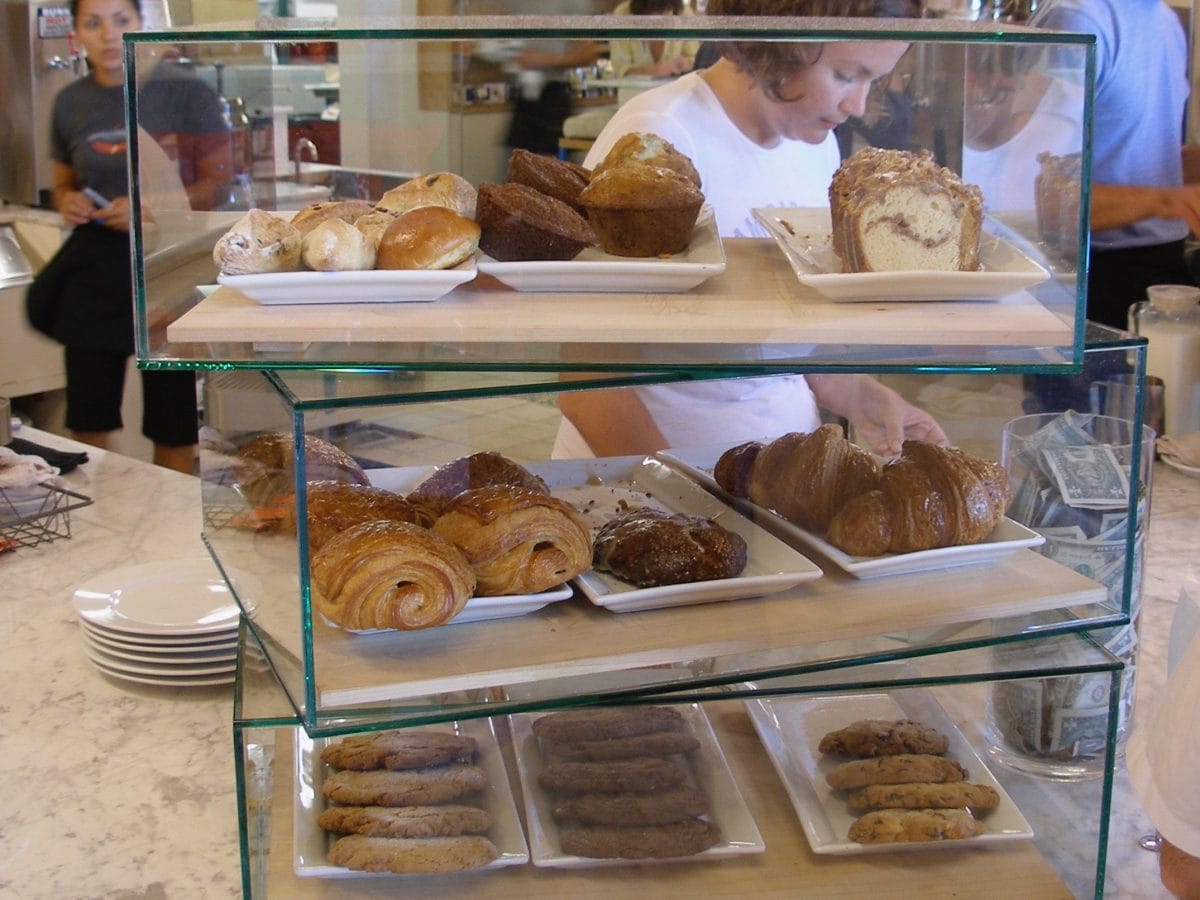
Intelligentsia has partnered with two highly-regarded local bakeries. Eric Kayser’s BREADBAR supplies almond, chocolate and plain croissants, plus mini olive or classic baguettes. Delilah Bakery in Echo Park displays sausage and cheddar or bacon and pepper Jack muffins, molasses cookies, gingerbread scones with maple frosting and slabs of carrot cake.
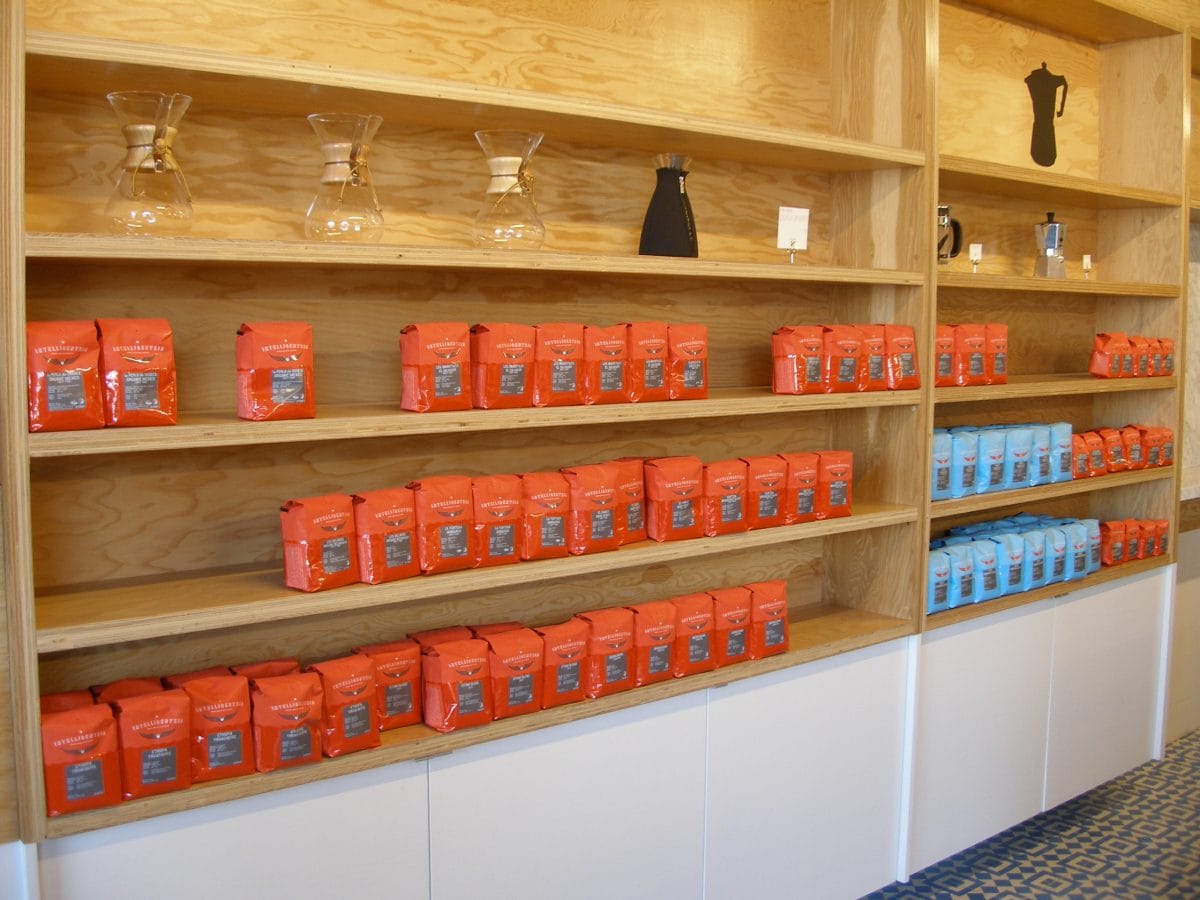
Intelligentsia sells coffee beans and tea leaves for home use. Orange bags are full-throttle. Blue bags are decaf. Clear-fronted silver bags contain tea leaves.
Intelligentsia is already operating at a higher level than other existing Los Angeles coffeehouses, but Kyle is convinced that the company will be even further along in six months. Intelligentsia plans to start hosting release events with chefs they sell coffee to. They plan to introduce people to cuppings and pairings. Intelligentsia also wants to hold Meet The Producer events, where they reward micro-lot coffee farmers with trips to L.A.
According to Deanna, Intelligentsia is still working to open a roasting facility in Glassell Park. Until that happens, which could take until the end of the year, they have to ship fresh-roasted beans daily from Chicago. The product is still excellent, but the process is expensive for the Intelligentsia, and the beans are subjected to possible temperature fluctuation in the air or in hot delivery trucks. When Intelligentsia reaches its full potential, Angelenos are really in store for caffeinated greatness.

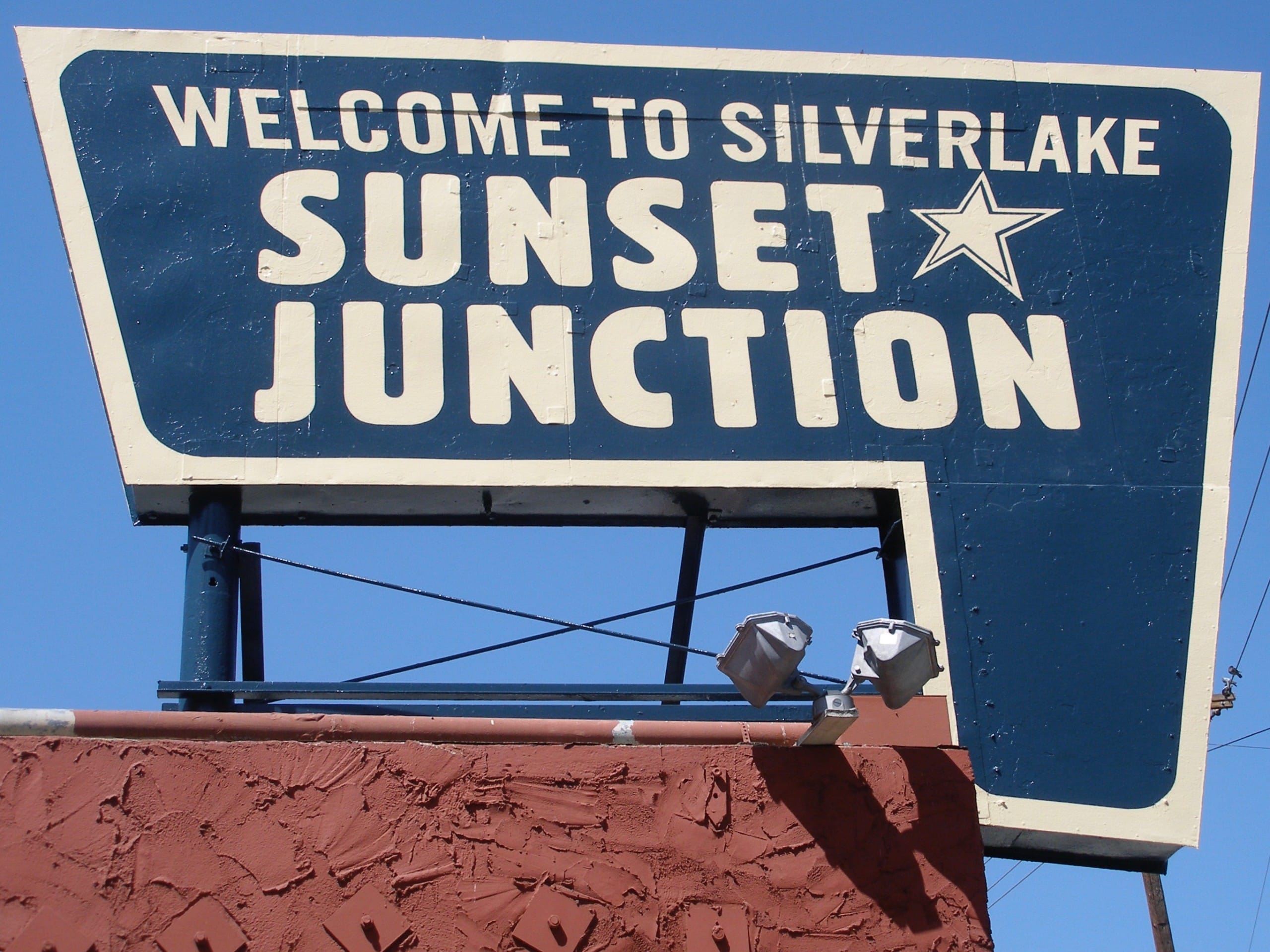
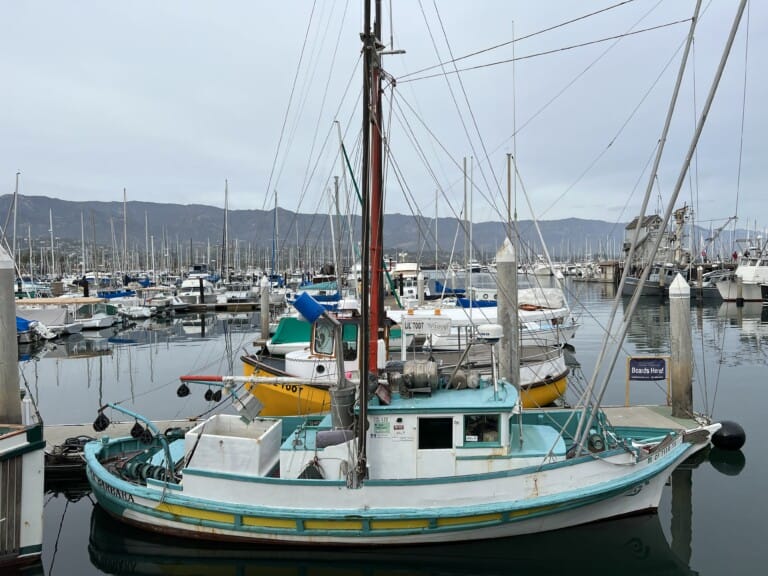
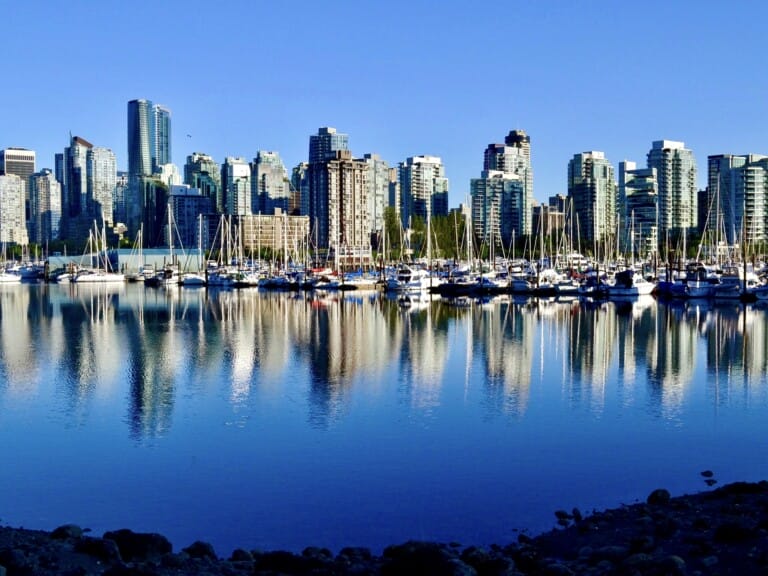
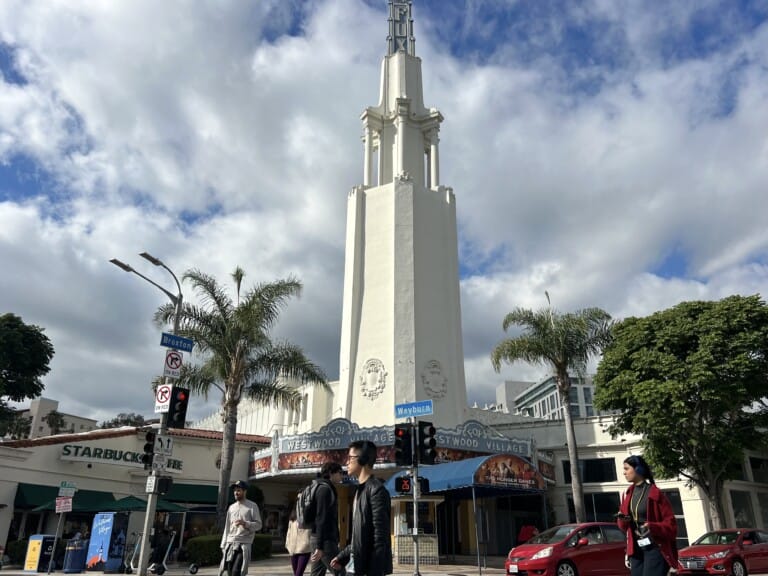




Blog Comments
Specialty’s Specializing in…Coffee? « Man Seeking Coffee
October 7, 2009 at 5:04 PM
[…] There will also be Black Cat espresso and Intelligentsia signature drinks such as the Angeleno (1,2,3). While this high end, slow food take on a Starbucks coffee slushy doesn’t move me much […]